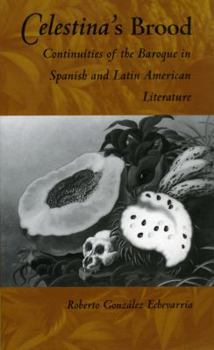Celestina's Brood: Continuities of the Baroque in Spanish and Latin American Literature
Published in 1499 and centered on the figure of a bawd and witch, Fernando de Rojas' dark and disturbing Celestina was destined to become the most suppressed classic in Spanish literary history. Routinely ignored in Spanish letters, the book nonetheless echoes through contemporary Spanish and Latin American literature. This is the phenomenon that Celestina's Brood explores.
Roberto Gonz lez Echevarr a, one of the most eminent and influential critics of Hispanic literature writing today, uses Rojas' text as his starting point to offer an exploration of modernity in the Hispanic literary tradition, and of the Baroque as an expression of the modern. His analysis of Celestina reveals the relentless probing of the limits of language and morality that mark the work as the beginning of literary modernity in Spanish, and the start of a tradition distinguished by a penchant for the excesses of the Baroque. Gonz lez Echevarr a pursues this tradition and its meaning through the works of major figures such as Cervantes, Lope de Vega, Calder n de la Barca, Alejo Carpentier, Carlos Fuentes, Gabriel Garc a M rquez, Nicol s Guill n, and Severo Sarduy, as well as through the works of lesser-known authors.
By revealing continuities of the Baroque, Celestina's Brood cuts across conventional distinctions between Spanish and Latin American literary traditions to show their profound and previously unimagined affinity.
Roberto Gonz lez Echevarr a, one of the most eminent and influential critics of Hispanic literature writing today, uses Rojas' text as his starting point to offer an exploration of modernity in the Hispanic literary tradition, and of the Baroque as an expression of the modern. His analysis of Celestina reveals the relentless probing of the limits of language and morality that mark the work as the beginning of literary modernity in Spanish, and the start of a tradition distinguished by a penchant for the excesses of the Baroque. Gonz lez Echevarr a pursues this tradition and its meaning through the works of major figures such as Cervantes, Lope de Vega, Calder n de la Barca, Alejo Carpentier, Carlos Fuentes, Gabriel Garc a M rquez, Nicol s Guill n, and Severo Sarduy, as well as through the works of lesser-known authors.
By revealing continuities of the Baroque, Celestina's Brood cuts across conventional distinctions between Spanish and Latin American literary traditions to show their profound and previously unimagined affinity.
Format:Paperback
Language:English
ISBN:0822313715
ISBN13:9780822313717
Release Date:September 1993
Publisher:Duke University Press
Length:272 Pages
Weight:1.00 lbs.
Dimensions:0.9" x 5.6" x 9.0"
Customer Reviews
0 rating





